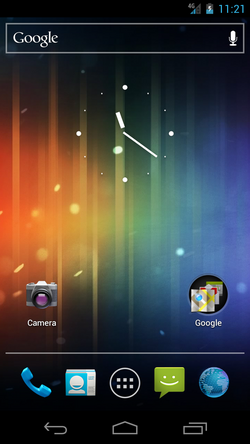
Back أندرويد أيس كريم ساندويتش Arabic Android Ice Cream Sandwich Catalan ئەندرۆید ئایسکریم ساندویچ CKB Android Ice Cream Sandwich Czech Android Ice Cream Sandwich German Android Ice Cream Sandwich Greek Android Ice Cream Sandwich Spanish اندروید بستنی حصیری Persian Android Ice Cream Sandwich French אנדרואיד אייס קרים סנדוויץ' HE
| Version of the Android operating system | |
 | |
 Android 4.0 home screen on Galaxy Nexus | |
| Developer | |
|---|---|
| Released to manufacturing | October 19, 2011 |
| Final release | 4.0.4_r2.1 (IMM76L)[1] / June 6, 2012 |
| Kernel type | Monolithic (Linux) |
| Preceded by | Android 2.3.7 "Gingerbread" (smartphones) Android 3.2.6 "Honeycomb" (tablets) |
| Succeeded by | Android 4.1 "Jelly Bean" |
| Official website | developer |
| Support status | |
| Unsupported since December 6, 2018, Google Play Services support dropped since February 2019[2] | |
Android Ice Cream Sandwich (or Android 4.0) is the fourth major version of the Android mobile operating system developed by Google. Unveiled on October 19, 2011, Android 4.0 builds upon the significant changes made by the tablet-only release Android Honeycomb, in an effort to create a unified platform for both smartphones and tablets. The first phone with Android Ice Cream Sandwich was Samsung Galaxy Nexus.
Android 4.0 was focused on simplifying and modernizing the overall Android experience around a new set of human interface guidelines. As part of these efforts, it introduced a new visual appearance codenamed "Holo", which is built around a cleaner, minimalist design, and a new default typeface named Roboto. It also introduced a number of other new features, including a refreshed home screen, near-field communication (NFC) support and the ability to "beam" content to another user using the technology, an updated web browser, a new contacts manager with social network integration, the ability to access the camera and control music playback from the lock screen, visual voicemail support, face recognition for device unlocking ("Face Unlock"), the ability to monitor and limit mobile data usage, and other internal improvements.
Android 4.0 received positive reviews by critics, who praised the cleaner, revamped appearance of the operating system in comparison to previous versions, along with its improved performance and functionality. However, critics still felt that some of Android 4.0's stock apps were still lacking in quality and functionality in comparison to third-party equivalents, and regarded some of the operating system's new features, particularly the "face unlock" feature, as being gimmicks.
As of October 2022[update], statistics issued by Google indicate that 0.15% of all Android devices accessing Google Play run Ice Cream Sandwich.[4]
- ^ "Android Source". Google Git. June 6, 2012. Archived from the original on May 11, 2019. Retrieved October 15, 2017.
- ^ "Google is ending Play Service support for Android 4.0 Ice Cream Sandwich". 7 December 2018. Archived from the original on 27 August 2022. Retrieved 27 August 2022.
- ^ "Android 4.0 Platform and Updated SDK Tools". Archived from the original on 2021-05-19. Retrieved 2021-05-28.
- ^ "Dashboards | Android Developers". developer.android.com. Archived from the original on 2018-01-10. Retrieved 2018-07-01.
© MMXXIII Rich X Search. We shall prevail. All rights reserved. Rich X Search